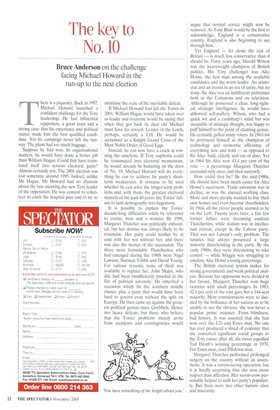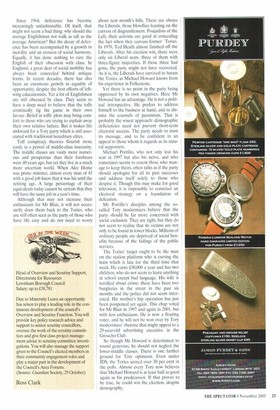The key to \o. 10
Bruce Anderson on the challenge facing Michael Howard in the run-up to the next election
T, here is a piquancy. Back in 1997,
Michael Howard launched a confident challenge for the Tory leadership. He had influential supporters, a good team and a strong case: that his experience and political stance made him the best qualified candidate. Yet his campaign never left the runway. The plane had too much baggage.
Suppose he had won. In organisational matters, he would have done a better job than William Hague. Could that have translated itself into serious electoral gains? Almost certainly not. The 2001 election was lost sometime around 1995. Indeed, unlike Mr Hague. Mr Howard had no illusions about the fate awaiting the new Tory leader of the opposition. He was content to volunteer to catch the hospital pass and to try to minimise the scale of the inevitable defeat.
If Michael Howard had led the Tories in 2001. William Hague would have taken over as leader and everyone would be saying that when they got back in, dear old Michael must have his reward. Leader of the Lords, perhaps, certainly a CH. He would be acclaimed as a Knight Grand Cross of the Most Noble Order of Good Eggs.
Instead, he can now have a crack at winning the omelette. If Tory euphoria could be transmuted into electoral momentum, he would already be battering on the door of No. 10. Michael Howard will do everything he can to address his party's shortterm weaknesses. It remains to be seen whether he can solve the longer-term problems and, with them, the greatest electoral mystery of the past 40 years: the Tories' failure to turn demography into hegemony.
It is possible to explain the Tories' decade-long difficulties solely by reference to events, men and a woman. By 1990, Margaret Thatcher was politically exhausted, but her demise was always likely to be traumatic, Her party could neither be at ease with her nor without her, and there was also the matter of the succession. The three most formidable Thatcherites who had emerged during the 1980s were Nigel Lawson, Norman Tebbit and David Young. For various reasons, none of them was available to replace her. John Major, who did, had been insufficiently proofed in the fire of political adversity. He inherited a recession which hit the southern middle classes, plus a party that would have been hard to govern even without the split on Europe. He then came up against the greatest political genius since Goebbels. Hence two heavy defeats, but those who believe that the Tories' problems merely arose from accidents and contingencies would argue that normal service might now be restored. As Tony Blair would be the first to acknowledge, England is a conservative country. England is also beginning to see through him.
Yet England — let alone the rest of Britain — is much less conservative than it should be. Forty years ago, Harold Wilson was the heavyweight champion of British politics. His Tory challenger was Alec Home, the best man among the available candidates and the worst leader. An aristocrat and an ironist in an era of satire, but no irony, Sir Alec was an indifferent performer both in the Commons and on television. Although he possessed a clear, long-sighted, strategic intelligence, he would have abhorred self-puffery. Wilson, who had a quick wit and a cardsharp's mind but was incapable of strategic thought, was happy to puff himself to the point of claiming genius. He certainly gulled many voters. In 1963-64 he portrayed himself as the champion of technology and economic efficiency, of everything new and bold — as opposed to Sir Alec: bald, elderly and out of date. Yet in 1964 Sir Alec won 43.4 per cent of the vote — a percentage Margaret Thatcher exceeded only once, and then narrowly.
How could that be? By the mid-1980s, life should have been much easier for Alec Home's successors. Trade unionism was in decline, as was the manual working class. More and more people wanted to buy their own homes and even become shareholders. In 1964, all the clever people seemed to be on the Left. Twenty years later, a fair few former lefties were becoming exultant Thatcherites, while statism was in intellectual retreat, except in the Labour party. That was not Labour's only problem. The lunatics had always possessed a large minority shareholding in the party. By the early 1980s, they were threatening to take control — while Maggie was struggling to emulate Alec Home's losing percentage.
The British electoral system makes for strong governments and weak political analysis. Because her opponents were divided in her favour, Margaret Thatcher won huge victories with small percentages. In 1983, 42.4 per cent of the vote gave her a 144-seat majority. Most commentators were so dazzled by the brilliance of her success as to be unable to see the obvious: she was never a popular prime minister. From blindness, bad history. It was asserted that she had won over the C2s and Essex man. No one has ever produced a shred of evidence that she converted significant social groups to the Tory cause; after all, she never equalled Ted Heath's winning percentage in 1970. For Essex man, read Piltdown man.
Margaret Thatcher performed prolonged surgery on the country without an anaesthetic. It was a nation-saving operation, but it is hardly surprising that she won more respect than affection. Her storm-crow personality helped to curb her party's popularity. But there were two other factors: class and insecurity.
Since 1964, deference has become increasingly unfashionable. Of itself, that might not seem a bad thing: why should the average Englishman not walk as tall as the average American? But the decay of deference has been accompanied by a growth in incivility and an erosion of social harmony. Equally, it has done nothing to cure the English of their obsession with class. In England, a great deal of social mobility has always been concealed behind antique forms. In recent decades, there has also been an enormous growth in equality of opportunity, despite the best efforts of leftwing educationists. Yet a lot of Englishmen are still obsessed by class. They seem to have a deep need to believe that the toffs continually rig the game in their own favour. Belief in toffs' plots may bring comfort to those who are trying to explain away their own relative failure. But it makes life awkward for a Tory party which is still associated with traditional hereditary elites.
Toff conspiracy theories flourish more easily in a period of middle-class insecurity. The middle classes are vastly more numerous and prosperous than their forebears were 40 years ago, but yet they live in a much more uncertain world. When Alec Home was prime minister, almost every man of 45 with a good job knew that it was his until the retiring age. A large percentage of their equivalents today cannot be certain that they will have the same job in a year's time.
Although that may not increase their enthusiasm for Mr Blair, it will not necessarily draw them back to the Tories, who are still often seen as the party of those who have life easy and do not need to worry about next month's bills. There are always the Liberals, those blowflies feasting on the carrion of disgruntlement. Poujadists of the Left, their activists are good at concealing the fact when they canvass former Tories. In 1970, Ted Heath almost finished off the Liberals. After his election win, there were only six Liberal seats, three of them with three-figure majorities. If those three had gone, the party might not have recovered. As it is, the Liberals have survived to harass the Tories, as Michael Howard knows from his experience in Folkestone, Yet there is no point in the party being oppressed by its own negatives. Here Mr Howard has an advantage. He is not a political introspective. He prefers to address himself to the business at hand, and to dis miss the counsels of pessimism. That is probably the wisest approach: demographic deficiencies need not prevent short-term electoral success. The party needs to trust its message, and to be confident in an appeal to those whom it regards as its natural supporters.
Michael Portillo, who not only lost his seat in 1997 but also his nerve, and who sometimes seems to resent those who man age to keep theirs, often talks as if the party should apologise for all its past successes and address itself solely to those who despise it. Though this may make for good television, it is impossible to construct an electoral strategy on a foundation of defeatism, Mr Portillo's disciples among the socalled Tory modernisers believe that the party should be far more concerned with social exclusion. They are right, but they do not seem to realise that its victims are not only to be found in tower blocks. Millions of ordinary people are deprived of social benefits because of the failings of the public services.
The Tories' target ought to be the man on the station platform who is cursing the train which is late for the third time that week. He earns £30,000 a year and has two children, who do not seem to learn anything at school except bad language. His wife is terrified about crime; there have been two burglaries in the street in the past six months and the police did not seem inter ested. His mother's hip operation has just been postponed yet again. This chap voted for Mr Blair in 1997 and again in 2001, but with less enthusiasm. He is now a floating voter, and he will not be won over by Tory modernisers' rhetoric that might appeal to a 29-year-old advertising executive in the Groucho Club.
So though Mr Howard is determined to sound generous, he should not neglect the lower-middle classes. There is one further ground for Tory optimism. Even under IDS, the Tories scored over 30 per cent in the polls. Almost every Tory now believes that Michael Howard is at least half as good again as his predecessor. If that proves to be true, he could win the election, despite demography,



































































































 Previous page
Previous page